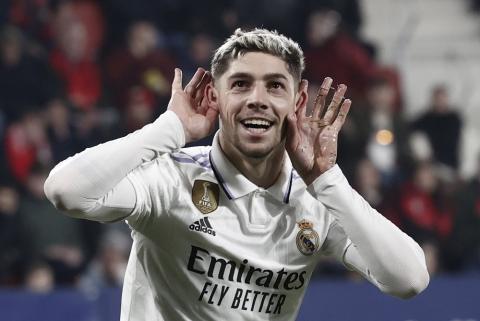
Real are two games away from winning three Champions League titles in a row.
Success in Europe, though, has not been matched by similar number of league titles in Spain.
LONDON: Real Madrid stand two games from becoming the first side since Bayern Munich in 1976 to be European champions three years in a row. Hold on to a 2-1 first-leg lead at home against Bayern Munich and then beat Liverpool or Roma in Kiev and they will have won four Champions Leagues out of the past five.
That should make them, particularly given no side had so much as retained the trophy since 1990, one of the greatest teams of all time. And yet a strange sense lingers that, and there is no sophisticated way of putting this, they are not really very good.
Part of the problem is that their football is not that of a philosopher like Pep Guardiola or Jurgen Klopp or even Jose Mourinho. There is no sense in which, tactically at least, they are breaking new ground. To try to define their football and explain how they play is difficult. They have lots of good players, they score goals, usually more than the opposition. But there is no great sense of process — and in a sense that makes them a perfect representation of football’s modern age.
This is a time when the most important factor in football is money. It can feel as though players at Real Madrid are signed less for how they will fit into the team than how they fill suit the marketing strategy. Their own directors have said that the club models itself on Disney: It is a content provider. And if you have a lot of talented footballers, the chances are that at some point some of them, usually Cristiano Ronaldo, will do something brilliant.
That is not a sustainable strategy over the course of a full season, which is why Madrid have won only two league titles in the past 10 years. But it does seem to work in the Champions League when they may only really have to perform in three or four games. For a club of Madrid’s stature the group stage is as good as a given, and after that it depends on the luck of the draw. Last season, admittedly, was difficult: Madrid had to beat Napoli, Bayern, Atletico and Juventus in the knockout stages. But the season before was probably as straightforward a run as any side has had in the Champions League era: Roma, Wolfsburg, a supine Manchester City and Atletico.
This season, they had a celebrity clash against PSG, a team based even more around the cult of the individual than Madrid, then an aging Juve side that should have gone out to Tottenham in the previous round, and now an ever more superannuated Bayern who are racked by injuries.
After Liverpool’s extraordinary 5-2 victory over Roma the previous night what was striking about Madrid’s win at Bayern was not just the lack of attacking intent, but the lack of quality. Passes went astray and there was a lack of pace to the game. And yet Madrid, once again, prevailed. There are many doubts about Zinedine Zidane as a coach, not least over his seeming inability to set a team up to control a game — which was what almost allowed Juve’s improbable comeback in the quarters — but where he excels is in his substitutions. And that also lends itself to success in one-off cup games rather than over a league season. This Madrid may not be a great side in the traditional sense, but they are very good at winning knockout ties.
KEY CLASH — SERGIO RAMOS v ROBERT LEWANDOWSKI
It’s five years since Robert Lewandowski propelled himself into the global consciousness by scoring four goals in the first leg of the Champions League semifinal for Borussia Dortmund against Real Madrid.
The announcement he would leave and join Bayern came the following month, shortly before the final. The Poland international has made clear he has been less than impressed by some of Bayern’s recent transfer activity and the widespread assumption is he will leave in the summer. He has been clear too that he would welcome a move to Madrid. Putting them out of the Champions League would be an excellent way of underlining his quality to them. Lewandowski was quiet in the first leg, though, well-marshalled by Sergio Ramos, who played in that 2013 semifinal but at right-back.












